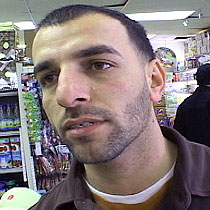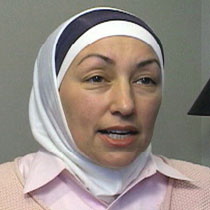-
(单词翻译:双击或拖选)
Detroit, Michigan
10 May 2007
There has long been concern within the Iraqi-American community in the United States that the war in Iraq, and the violence there between Sunnis and Shias, could spark tensions at home. Today, in our weekly series "Searching for Solutions," we look at efforts within one American Muslim community to ease those tensions.
Twenty prominent Muslim leaders in Detroit, Michigan today signed an "Intra-Faith Code of Honor," condemning2 all forms of sectarian violence and forbidding hate speech. VOA's Brian Padden visited Detroit, and nearby communities in central Michigan, where some 500,000 Muslims and Arab Americans live. He filed this report.
 |
| Fadhel Iljebori closely monitors the events in Iraq |
"It's like what we see on TV. What's going on TV, car bombs, and innocent people falling dead every day, for no reason? It makes us mad to see that happen over there, Iraq."
Like most people who live in this Arab American community in Dearborn, Michigan, his anger has not turned into acts of sectarian violence. Such upheavel is rare in American communities where the police and courts maintain law and order.
Also instrumental in keeping the peace among Muslims in Michigan are leaders such as Sunni Farhan Latif, the Muslim student advisor3 at the University of Michigan. "The need for dialogue has increased. And the need to discuss issues and to understand one another better and to basically to set an example for others to follow, has become more of a priority."
Latif says after the 2006 bombing of the Golden Mosque4 in Samarra, one of Shia Islam's holiest shrines5, both Sunni and Shia leaders in Michigan began to meet regularly. At prayer services at the Islamic Center of America, Imams emphasized Muslim similarities over differences, and urged reconciliation6 over confrontation7.
 |
| Najah Bazzy |
There have been moments that tested the unity1 of the Michigan Muslim community, such as when Saddam Hussein was executed on the Sunni holiday of Eid.
Latif adds, "When Saddam was hanged you saw a mixed reaction in the community. Everyone was extremely happy that he was removed, whether Sunni or Shia, because he was a dictator and he had committed atrocities10 across the board. I know there was some discussion as to the timing11 of when it happened. That was something people were somewhat upset about, that it was insensitive to the Muslim community for happening on Eid -- the day."
Bazzy comments, "The execution caused some words, some exchanges but did that erupt in violence? No. That manifested itself in, 'that is a very barbaric thing to do'."
There were also some recent incidents of vandalism. In January, the words "9/11 Murderers" and "You Idol12 Worship" were spray-painted on the front of the mosque. But many people here believe this was an anti-Muslim hate crime, and not a Sunni on Shia attack.
Promptly13 investigating these incidents, and stressing that what unites them is stronger than what divides them, the Muslims of Michigan are preventing violence before it can erupt.
 收听单词发音
收听单词发音
1
unity

|
|
| n.团结,联合,统一;和睦,协调 | |
参考例句: |
|
|
|
2
condemning

|
|
| v.(通常因道义上的原因而)谴责( condemn的现在分词 );宣判;宣布…不能使用;迫使…陷于不幸的境地 | |
参考例句: |
|
|
|
3
advisor

|
|
| n.顾问,指导老师,劝告者 | |
参考例句: |
|
|
|
4
mosque

|
|
| n.清真寺 | |
参考例句: |
|
|
|
5
shrines

|
|
| 圣地,圣坛,神圣场所( shrine的名词复数 ) | |
参考例句: |
|
|
|
6
reconciliation

|
|
| n.和解,和谐,一致 | |
参考例句: |
|
|
|
7
confrontation

|
|
| n.对抗,对峙,冲突 | |
参考例句: |
|
|
|
8
activist

|
|
| n.活动分子,积极分子 | |
参考例句: |
|
|
|
9
instigating

|
|
| v.使(某事物)开始或发生,鼓动( instigate的现在分词 ) | |
参考例句: |
|
|
|
10
atrocities

|
|
| n.邪恶,暴行( atrocity的名词复数 );滔天大罪 | |
参考例句: |
|
|
|
11
timing

|
|
| n.时间安排,时间选择 | |
参考例句: |
|
|
|
12
idol

|
|
| n.偶像,红人,宠儿 | |
参考例句: |
|
|
|
13
promptly

|
|
| adv.及时地,敏捷地 | |
参考例句: |
|
|
|















